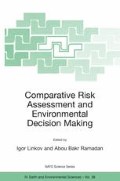Abstract
Water in sufficient quantity and of adequate quality is necessary for the well-being of all living organisms. The importance and intensive use of fresh water makes it a vulnerable and increasingly limited resource. A wide range of human activities may lead to environmental deterioration of surface and ground water, either directly or indirectly.
In arid and semi arid regions, water resources management issue turns to be more imperative and necessary due to the scarcity of water resources and the irregularities of water flows in time and space. Deteriorating water quality is a particular threat in countries with scare water resources.
As far as Egypt is concerned, adequate supplies of fresh water is critical to the long term, sustained growth and development. Historically, water resources management focused on reallocating water to when and where it was required, a supply-side approach. In recent years, it has become increasingly apparent that the quality of available water is as important as the quantity. Poor water quality can render available supplies unsuitable for its intended uses. Thus, water quality, if not adequately managed, can serve as a serious limiting factor to the future economic development and to the public health and the environment which will result in enormous long term costs to the society. This in turn could lead to irreversible damage to the quantity and quality of available water resources. Thus, the need for better management of the quality of water resources is greatly recognized.
Recently, water quality issues have received high attention in the overall water resources planning and polices in Egypt. A water quality management program, with a national perspective was developed and implemented, which is based on an integrated approach to water quality data collection, analysis, interpretation, management and coordination. This program will provide a strong scientific basis for sound policy development and decision-making and assist in the development of strategies to reduce current and avoid future water quality problems.
In this context, the paper examines the main aspects and problems concerned with water quality deterioration in Egypt along with its environmental impacts and constraints to sustainable development. The importance and role of monitoring, data management, technology transfer, institutional strengthening, collaboration between ministries and stakeholders and sound financial framework are examined. The efforts exerted by the Ministry of Water Resources and Irrigation for better water quality management are highlighted. Finally, the challenges and benchmarks that decision makers have to face and deal with, for future actions are briefly outlined.
Access this chapter
Tax calculation will be finalised at checkout
Purchases are for personal use only
Preview
Unable to display preview. Download preview PDF.
References
NWQCU (1995) “Assessment of Water Quality Hazards in Egypt.” National Water Quality Conservation Unit
MWRI (2000) “Task Force on water Quality Priorities and Strategies”.
NWQM (2001) “Water Quality Status for Surface and Groundwater”. NWQM Technical Report no. 4, NAWQAM Project.
NWRP (1999) “Water Quality and Pollution Control.” NWRP Technical Report No. 5.
Author information
Authors and Affiliations
Editor information
Editors and Affiliations
Rights and permissions
Copyright information
© 2004 Kluwer Academic Publishers
About this paper
Cite this paper
Abdel-Gawad, S.T. (2004). Water Quality Challenges Facing Egypt. In: Linkov, I., Ramadan, A.B. (eds) Comparative Risk Assessment and Environmental Decision Making. Nato Science Series: IV: Earth and Environmental Sciences, vol 38. Springer, Dordrecht. https://doi.org/10.1007/1-4020-2243-3_22
Download citation
DOI: https://doi.org/10.1007/1-4020-2243-3_22
Publisher Name: Springer, Dordrecht
Print ISBN: 978-1-4020-1895-4
Online ISBN: 978-1-4020-2243-2
eBook Packages: Earth and Environmental ScienceEarth and Environmental Science (R0)

